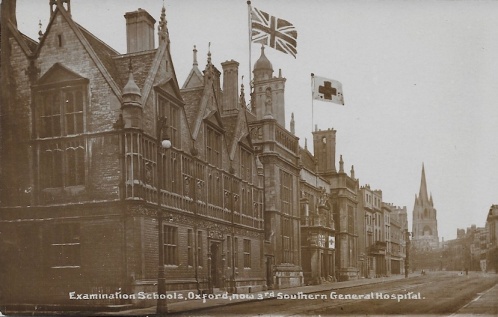The main purpose of this log was achieved some time ago: to record the events of the period of the Great War, as they impacted our small school here in Oxford. In particular, it sought to honour those who gave their lives.
However, I continue to follow the careers of those who fought and have survived the war and will record their peacetime progress.
Sadly, the news has reached us that another of those brave men who served in the war has died: Geoffrey Simeon, on December 27th 1923 at the Presidency General Hospital in Calcutta, following an accident, aged 35. On leaving us, he attended Marlborough as a Foundation Scholar, before going on to Oriel College Oxford. In the war, he served as a 2nd Lieut. with the Gurkha Rifles. At the time of his death he was working for Imperial Forest Services in India.
The latest edition of ‘The Draconian’, which has just been published, includes news concerning four of our wartime warriors:
Pat Duff, having been private secretary to Mr Stanley Baldwin, is now similarly private secretary for the new Prime Minister, Mr Ramsay MacDonald.
Sholto Marcon has played hockey for England and Donald Innes for Scotland.
Jack Haldane has had another book published: ‘Daedalus. or Science and the Future‘. It is based on a lecture he gave to the Heretics Club at Cambridge last year. In it he lists a number of developments he feels to be ‘probable’ in the next 50 years – for example:
“Though coal and oil fields fail, the intermittent energy of the wind will be transformed into continuous electrical power.”
He also voices a concern that not all scientific advances will be beneficial, unless there is a similar advance in ethics.
Perhaps the most startling of Jack’s ideas (at least to me as a non-scientist) is that concerning “ectogenesis“, suggesting that babies in 150 years time might be mostly conceived and grow outside the mother’s womb, in laboratory conditions (presumably). But this is not the full extent of Jack’s vision of the future.
“In the future perhaps it may be possible by selective breeding to change character as quickly as institutions. I can foresee the election placards of 300 years hence, if such quaint political methods survive, which is perhaps improbable, “Vote for Smith and more musicians”, “Vote for O’Leary and more girls”, or perhaps finally “Vote for Macpherson and a prehensile tail for your great-grandchildren”. We can already alter animal species to an enormous extent, and it seems only a question of time before we shall be able to apply the same principles to our own.”
This book has apparently inspired some intense debate. I am not surprised!















